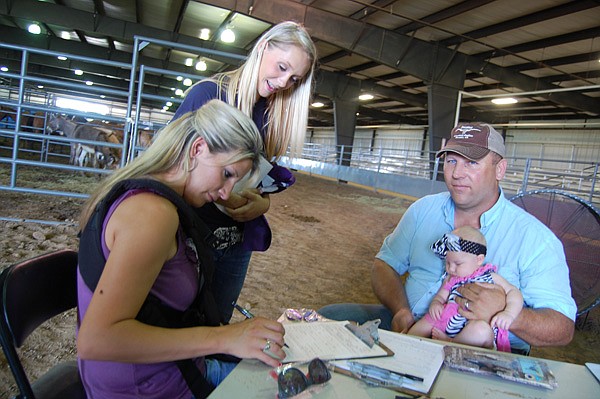BENTONVILLE - Wes Prestridge of Dover likes wild horses “because you can ride the hair off of them.”
Prestridge was at the Benton County Fairgrounds on Friday looking over 42 mustangs and eight burros that were up for adoption through a program run by the federal Bureau of Land Management.
Prestridge has adopted five mustangs through the Wild Horse and Burro Program since 2003. He later sold four of them.
All were easy to train except for one, a horse from Wyoming named Comanche. That’s the horse Prestridge decided to keep for himself.
“He’s a handful,” said Prestridge. “I’ve had bones broke off him.”
Prestridge said he suffered broken ribs when he was thrown from the horse. He said he and Comanche have a healthy respect for each other now.
Prestridge said he didn’t plan to adopt a horse Friday. He brought three grandchildren just to pique their interest in the horses. They’re riding smaller steeds for now.
The adoption event will continue from 8 a.m. to 7 p.m. today at the fairgrounds, said Emma Rinehart, a wild horse and burro specialist with the bureau, which is part of the Department of the Interior.
The event began Friday in Bentonville. As of 5 p.m. Friday, 10 horses and three burros had been adopted, said Fred Woehl of Harrison, a volunteer who was helping the bureau employees.
Marty Neugebauer, program supervisor for the bureau, said usually 50 percent to 60 percent of the horses they bring for such an event are adopted.
The bureau tries to hold two adoption events a year in Arkansas, he said. There was one in Jonesboro earlier this year, and he might schedule a third for Hope in October.
“We try not to go to the same place every year, because we don’t want to saturate the same market,” Neugebauer said.
Arkansas adoptions have been held in recent years in Pine Bluff, Fort Smith and Harrison, he said. Arkansas is one of the better states for adoptions, Neugebauer said.
The cost is $125 to adopt one horse or burro and $25 for each additional animal.
The horses can also be adopted via the Internet through blm.gov/adoptahorse.
Woehl helped Chris and Ashley Buffer adopt four mustangs Friday.
“I helped them place four horses in good homes,” said Woehl. “They’re off the government tax rolls.”
Woehl, a former employee of the U.S. Agriculture and State departments, said it costs the federal government between $2.50 and $4.50 per head per day to keep wild horses in holding facilities before they’re adopted.
Chris Buffer, who owns Decatur Livestock Auction, said he adopted three horses through the program about five years ago. Those horses worked out well and are used to pull a wagon, he said.
Woehl said some of the animals at the fairgrounds had been captured out West, but most were raised in captivity.
“They’re used to man,” he said. “They’re used to people bringing them hay. Horses in captivity don’t have to go 10 miles to get a drink of water.”
Woehl said he has trained more than 500 horses, and he has encountered only one mustang he couldn’t tame.
“It was a 7-year-old mustang that had been brought in off the range,” Woehl said. It’s now running free in a large pasture in Boone County, he said.
The bureau works to ensure that herd populations across 10 Western states are in balance with rangeland resources and other uses of the public lands, according to its website. The wild horses descended from horses that had previously escaped or were set free.
“To achieve this balance, the [bureau] must remove thousands of mustangs and burros from the range each year to control the size of herds, which have virtually no predators and can double in population every four years,” the website says.
The estimated free-roaming population of wild horses and burros on bureau-managed lands was about 37,300 last year. Another 49,500 wild horses and burros were being cared for in short-term corrals and long-term pastures as of May, according to the bureau.
A study released June 5 was critical of the bureau’s management of wild horses, which began with the 1971 Wild Free-Roaming Horses and Burros Act.
Conducted by the National Academy of Sciences at the behest of the bureau,the study concluded that the bureau had probably under-counted the horses by 10 percent to 50 percent, according to an article in the New York Times. It also said that the bureau’s horse removals might inadvertently allow the animal population to swell by reducing competition for forage.
Since 1971, the bureau has placed more than 230,000 wild horses and burros into private ownership through adoption, a process in which a citizen may receive the title of ownership to an animal after one year (with a limit of four titles per year, regardless of the number adopted), according to its website.
Northwest Arkansas, Pages 9 on 06/22/2013

